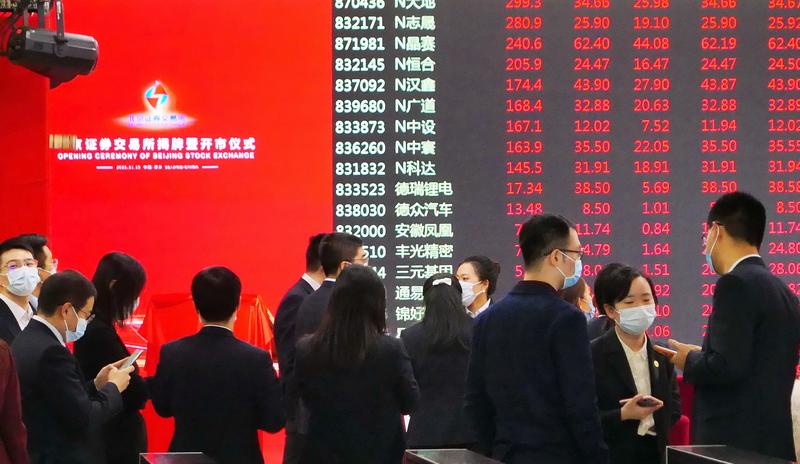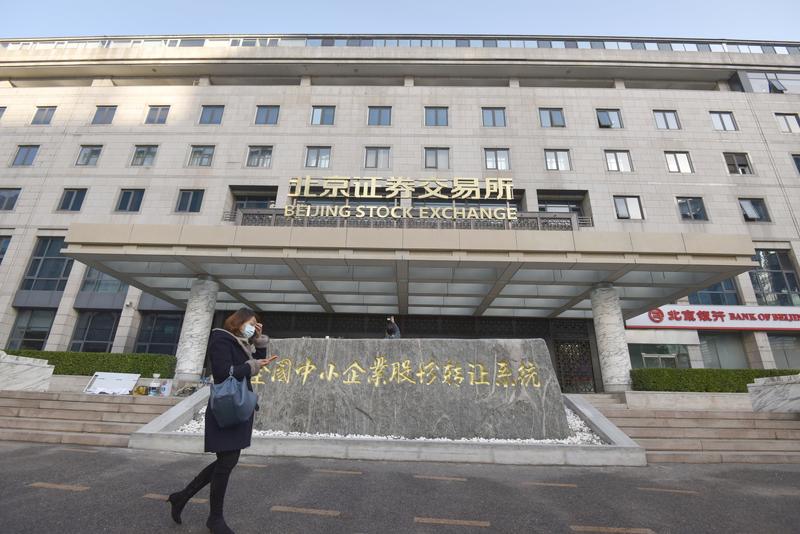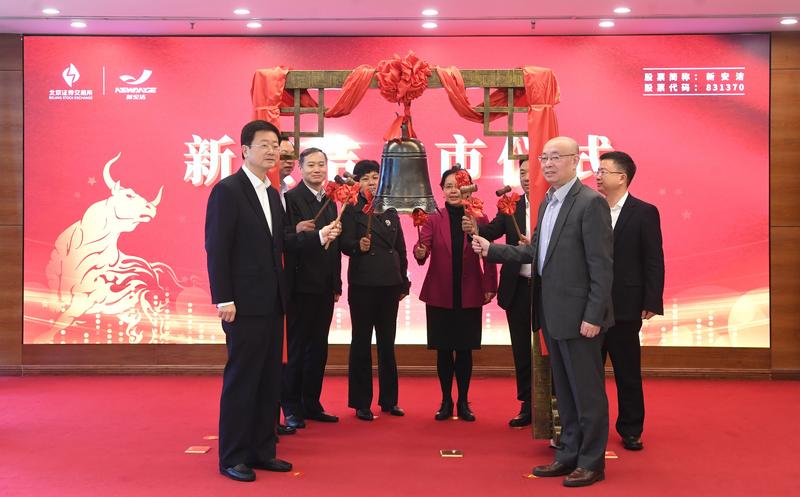New Beijing bourse highlights positive effects of opening-up on financial sector
 The Beijing Stock Exchange opens for business on Nov 15, providing a new financing channel for many small and medium-sized enterprises in China. The first batch of 81 companies have already debuted on the exchange. (FAN JIASHAN / FOR CHINA DAILY)
The Beijing Stock Exchange opens for business on Nov 15, providing a new financing channel for many small and medium-sized enterprises in China. The first batch of 81 companies have already debuted on the exchange. (FAN JIASHAN / FOR CHINA DAILY)
The Beijing Stock Exchange, which opened on Nov 15 for business and is expected to grow into the Chinese version of Nasdaq, has attracted the local capital markets' spotlight that was hitherto shining on bigger bourses such as the Shanghai Stock Exchange.
Now, foreign securities firms, which have played an increasingly bigger role in the A-share market, are unwilling to miss their chance to shine as well on the burgeoning bourse.
The inauguration of the BSE, the exchange’s positioning and related systemic arrangements point to the possibility of the BSE growing into the Chinese version of Nasdaq
Tim Tu, CEO of Credit Suisse Securities (China) Ltd
For instance, DBS Securities, from the stable of Singapore's DBS, is among the first few foreign securities firms that have received BSE membership. The firm is advancing IPO projects for the BSE, which are expected to enter the application phase next year.
DBS Securities is also working closely with other professional institutions like law firms to conduct internal communication and study BSE policies before their implementation.
The DBS management team said foreign investment banks are more experienced in seeking qualified foreign institutional investors or QFIIs, making more effective underwriting plans for issuers and attracting leading industry investors and strategic investors.
The risks embedded in the operations of small and medium enterprises-SMEs-require the involvement of professional institutions with corresponding risk-taking capabilities. For the BSE-listed SMEs, it will take a longer time for them to get rooted in the market, which means that foreign securities firms can give full play to their comprehensive financial services, DBS said.
Like DBS, UBS Securities Co Ltd, which is linked to its parent Swiss financial giant UBS Group AG, figures among the first few of the 112 member securities firms of the BSE.As UBS has received a license to conduct secondary market brokerage businesses at the BSE, the firm would like to bring more overseas experiences to the Chinese market, said Eugene Qian, its chairman.
The BSE is built on the NEEQ Select, the highest tier of the eight-year-old National Equities Exchange and Quotations system. Some 81 companies have debuted on the exchange already.
To help SMEs float successfully on the BSE, regulators have lowered the threshold. A company with market capitalization estimated at 200 million yuan ($31.3 million) can apply to go public on the bourse. More importantly, no stringent requirement has been set for BSE applicants' profitability. They just need to demonstrate that they have invested a sufficient amount of money in research and development.
 A woman walks past the Beijing Stock Exchange on Nov 14. The BSE is built on the NEEQ Select, the highest tier of the National Equities Exchange and Quotations system. (LU QIJIAN / FOR CHINA DAILY)
A woman walks past the Beijing Stock Exchange on Nov 14. The BSE is built on the NEEQ Select, the highest tier of the National Equities Exchange and Quotations system. (LU QIJIAN / FOR CHINA DAILY)
In comparison, the threshold is 1 billion yuan for a company planning to go public on the ChiNext of the Shenzhen Stock Exchange, which helps companies from traditional industries come up with new business models and patterns.
A similar benchmark is set for the STAR Market of the Shanghai Stock Exchange, which aims to nurture large technology companies.
Guidelines for QFIIs and RQFIIs to trade on the BSE took effect on its first trading day, which have paved the way for foreign investors.
Apart from bringing the experiences of exchanges from all over the world, JP Morgan will work actively to help companies float on the BSE and obtain refinancing, said Houston Huang, CEO and head of investment banking at JP Morgan Securities (China) Co Ltd.
"We would like to introduce more institutional investors and overseas investors into the Chinese market, as JP Morgan has multiple channels and a rich client base," Huang said. "It is our hope that this group of investors can participate in trading on the BSE via the QFII mechanism or other channels approved by regulators."
JP Morgan announced in early August that the China Securities Regulatory Commission has approved the registration of JP Morgan International Finance Ltd with 100 percent ownership of JP Morgan Securities (China) Co Ltd, making it the first foreign firm to fully own a securities venture in China.
No industry leader is left behind in the race to make their BSE presence felt. Shortly after the decision to set up the BSE was announced, Morgan Stanley responded instantly and came up with a research report on Sept 2, informing investors of the basics of the new bourse and its understanding of the BSE's positioning.
Integral to the construction of a multilevel capital market in China, the BSE will help stress direct financing. Some quality companies trading on the BSE are likely to migrate to the Shanghai and Shenzhen bourses in the future, according to Morgan Stanley.
Credit Suisse Securities (China) Ltd has been expanding its services in China by reaching out to more clients in the country. Credit Suisse Securities' expansion strategy is in line with the positioning of the BSE, which aims to nurture more innovative SMEs, said the firm's CEO Tim Tu.
Currently, Credit Suisse Securities is preparing the internal and external procedures to become a BSE member in the near term and link to the exchange's system, said Tu. By comparing the BSE with the Shanghai and Shenzhen bourses, Credit Suisse will help suitable clients to float on the former.
"Foreign securities companies only play a very small part in the NEEQ trading at present due to the concerns over resource endowment and yield on cost," said Tu. "Therefore, the stock connect program, which is now adopted by the Shanghai and Shenzhen exchanges, can be introduced to the BSE so that overseas investors can have more access to the Chinese capital market. Meanwhile, foreign securities firms and overseas investors can participate in the ongoing capital market reform in China."
 Newange Environmental Sanitation Co Ltd holds a bell ringing ceremony at its headquarters in Chongqing on Nov 15 to celebrate its listing on the Beijing Stock Exchange. (CHEN CHAO / CHINA NEWS SERVICE)
Newange Environmental Sanitation Co Ltd holds a bell ringing ceremony at its headquarters in Chongqing on Nov 15 to celebrate its listing on the Beijing Stock Exchange. (CHEN CHAO / CHINA NEWS SERVICE)
As Tu understands, the history of Nasdaq in the United States can work as a solid reference. A migration system also exists at Nasdaq, as Nasdaq-listed companies can be transferred to the New York Stock Exchange when they grow big enough for the bigger bourse.
However, an increasing number of quality companies, especially technologically advanced companies, have chosen to stay with Nasdaq, making it the listing venue for the world's technology giants such as Microsoft, Apple and Google, he said.
"The inauguration of the BSE, the exchange's positioning and related systemic arrangements point to the possibility of the BSE growing into the Chinese version of Nasdaq. This is why, foreign institutions are not willing to steer clear of it."
Foreign institutions' quick moves on the BSE is just one snapshot of their increasing interest in the A-share market. Through QFII and stock connect programs between Hong Kong, Shanghai and Shenzhen, Guangdong province, the net inflow of foreign investment reached nearly 241 billion yuan between January and October this year, which has already overtaken the whole-year figure of 208.9 billion yuan in 2020. By the end of October, foreign investors held up to 3.67 trillion yuan worth of A shares measured by market cap, equaling nearly 5 percent of the entire A-share market value. That ratio was merely 0.3 percent a decade ago.
CSRC Vice-Chairman Fang Xinghai said at the China-Singapore (Chongqing) Connectivity Initiative Financial Summit 2021 on Nov 23 that foreign investors have been steadily improving their positions in the A-share market, reflecting their increasing interest in, and recognition by, the Chinese capital market, which has been advancing its further opening-up.
Wong Kok Hoi, founder and chief investment officer of the Singapore-based APS Asset Management Pte Ltd, said the launch of the BSE may impel foreign investors to change their investment style in the A-share market.
Although the BSE features vigorous and mushrooming small companies, small-cap companies in the other boards of the A-share market may draw more attention from foreign investors, especially when regulation on technology behemoths may continue to tighten, he said.
Among the first batch of 81 companies listed on the BSE, 87 percent of them are from advanced manufacturing, modern services, high-tech services and strategic emerging industries. Seventeen of the first debutants are "little giants "recognized by the Ministry of Industry and Information Technology. They are leading SMEs that specialize in niche sectors, command a high market share and boast strong innovative capacity and core technologies.
The companies' average annual R&D investment was 25.3 million yuan in 2020, which was over 4 percent of their average annual sales revenue last year. A-share companies devoted an average 1.92 percent of their annual income to R&D last year.
Robin Xing, chief economist of Morgan Stanley China, agreed that foreign investors may change their investment structure in China.
As the central government attaches greater importance to advanced manufacturing, new energy industrial chains, domestic consumer staples, as well as the self-dependent technology hardware and semiconductor sectors, global capital will enhance their position in these spaces accordingly and reduce their allocations to internet-based platforms, Xing said.


